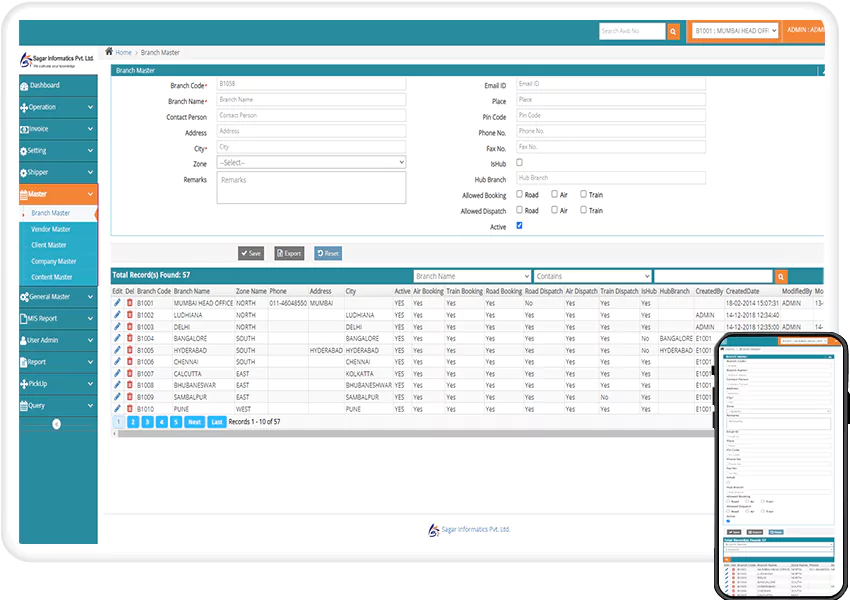

Effective tool for industrial decision-makers
Logistics management is the part of supply chain management that plans, implements, and controls the efficient, effective forward, and reverse flow and storage of goods, services, and related information between the point of origin and the point of consumption in order to meet customer's requirements and our logistics planning software is designed for planning, control and implementation of the effective movement and storage of related information, goods and services from origin to destination.
Striking Features of Logistics Management Software
Allows you to keep tabs on your products while they’re in transit. You can view the location of your product, and receive status updates, when the shipment has been delivered.
Manifests are lists of all the items which should be loaded on a transportation service. Usually created after information is collected from each party involved in the shipment.
Tool for tracking the number of personnel on board and in transit. The information displayed on the list includes: number of employees, Date on Board, and Weight Summary etc.
With these features you can improve efficient processes, increase visibility, and strengthen your competitive advantage in today’s global market.
Smart allocation system, consignments are automatically matched with vehicles based on their weight, delivery location, and other factors.
Automate fleet management and improve efficiency, monitoring with real-time GPS data, mapping consignments with vehicles based on weight, delivery location, other factors.
What Your Existing Business Gains with Logistics Management Software?
Allows businesses to make well-informed decisions, spot supply chain problems and increase productivity by streamlining communication with deep insights and data.
The software allows the customer about their product delivery. And in-depth analysis of customers is beneficial to businesses. And it enhances brand loyalty.
The system can control the inventory level and analyze the demand and supply well. With the help of which businesses can utilize their cost in a good way.
Monitoring and controlling the operations in a warehouse. It enhances the timely distribution of the goods by ensuring that all the aspects.
Route planning software to improve their logistics operations and boost customer experience. And it’s enhanced timely delivery, reducing manual dependency.
Automation has become a high priority because it eliminates manual errors and dependencies in the supply chain. that helps organizations, streamline their processes.
Frequently Asked Questions on Logistics Management Software (LMS)
Logistics management software, or supply chain management software, is a specialized application or system that helps businesses streamline and optimize their logistics and supply chain operations. It provides tools and features to assist in the planning, execution, and monitoring of various logistical activities, such as inventory management, order processing, transportation, warehousing, and distribution.
The software is designed to improve the efficiency, visibility, and coordination of the entire supply chain, enabling organizations to make informed decisions, reduce costs, enhance customer satisfaction, and increase overall operational performance. It is a central hub for managing and coordinating the flow of goods, information, and resources across different supply chain stages.
Tracking inventory levels, stock movements, and order fulfillment.
Processing and managing customer orders, including order entry, tracking, and fulfillment.
Optimizing warehouse operations, including receiving, put-away, picking, packing, and shipping.
Planning and optimizing transportation routes, carrier selection, shipment tracking, and freight auditing.
Providing real-time visibility into the status and location of goods throughout the supply chain.
Analyzing historical data and market trends to forecast future demand and optimize inventory levels.
Managing supplier relationships, tracking performance, and ensuring timely deliveries.
Generating reports and analyzing key performance indicators (KPIs) to evaluate and improve supply chain performance.
By implementing logistics management software, businesses can automate manual processes, reduce errors, improve data accuracy, enhance collaboration with suppliers and customers, and achieve greater operational efficiency and customer satisfaction.
Logistics management software integrates various functionalities and processes in the supply chain to streamline operations and facilitate effective management.
Here's a general overview of how logistics management software typically works:
The software integrates with various systems and databases within the organization, such as enterprise resource planning (ERP) systems, warehouse management systems (WMS), transportation management systems (TMS), and other relevant applications. This allows for the exchange of data and information across different functions and departments.
The software utilizes historical data, market trends, and demand forecasting algorithms to assist in planning and decision-making. It helps determine optimal inventory levels, anticipate demand, and plan transportation routes and schedules.
When a customer places an order, the software facilitates order processing by automating tasks such as order entry, order verification, inventory allocation, and order confirmation.
The software tracks inventory levels in real-time, including stock levels, locations, and movements. It helps optimize inventory by generating replenishment plans, identifying slow-moving or obsolete items, and ensuring sufficient stock availability to meet customer demand.
Logistics management software helps optimize warehouse operations for businesses with warehouses. It assists in managing receiving, put-away, picking, packing, and shipping processes, ensuring efficient use of space, accurate inventory tracking, and timely order fulfillment.
The software assists in planning and optimizing transportation activities. It helps select the best carriers, optimize routes, schedule shipments, track deliveries, and manage freight costs. It may also provide features for managing documentation, customs compliance, and freight auditing.
Logistics management software provides real-time visibility into the supply chain by tracking the movement of goods, updating inventory levels, and sharing information with suppliers, partners, and customers. This enhances coordination, reduces delays, and improves customer service.
The software generates reports and dashboards that provide insights into key performance indicators (KPIs) such as order fulfillment rates, inventory turnover, transportation costs, and customer satisfaction. This allows businesses to monitor performance, identify bottlenecks, and make data-driven decisions to optimize their supply chain.
Maximize Logistics Efficiency with Courier Management Software
Acquire our high-tech products and services for your business without any delay
 Head Office
Head Office66/A First Floor, Gyandeep Complex
Munirka, New Delhi - 110067 INDIA.
+91 11 46048550
+91-9311746788, +91-9311133772
info@sagarinfotech.com
 USA Office
USA Office100 E Pine, St STE 110 Orlando
FL 32801 USA.
+1 407 451 8030
info@sagarinfotech.com
 UK Office
UK OfficePenstraze Business Center, Truro,
Cornwall, TR4 8PN, United Kingdom.
+44 7811 451024
info@sagarinfotech.com